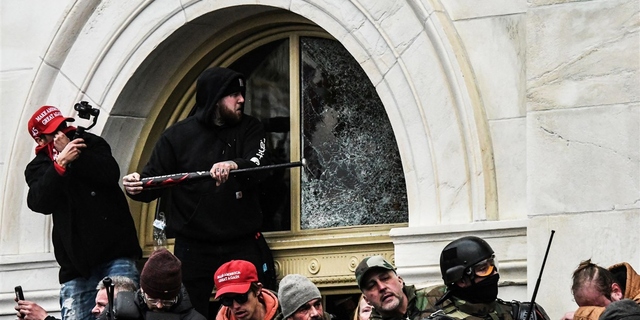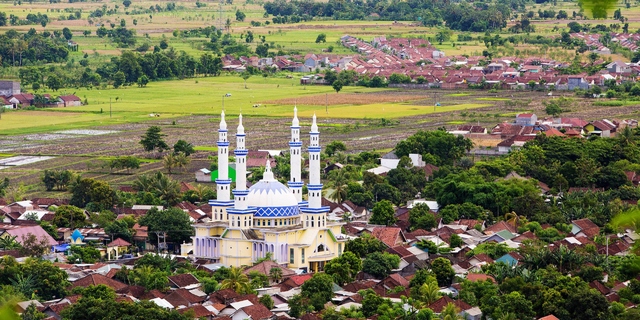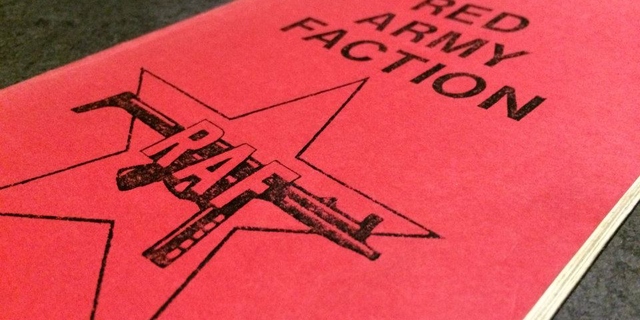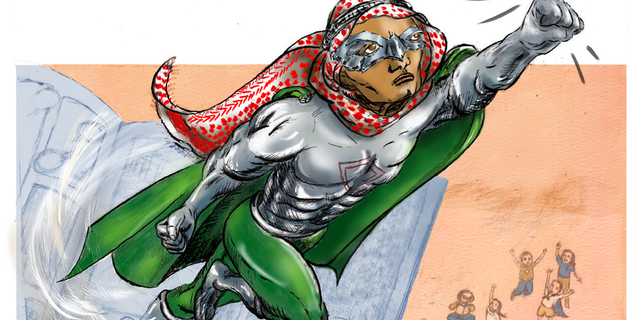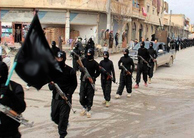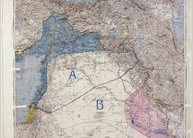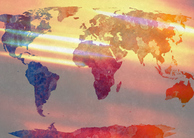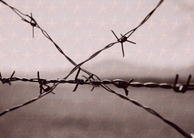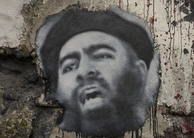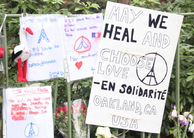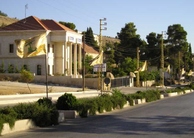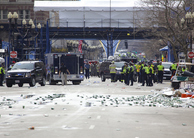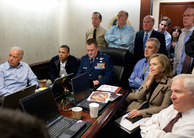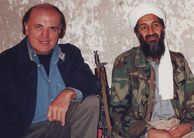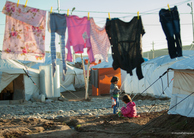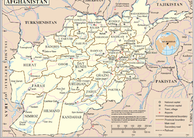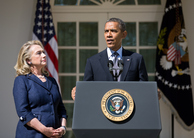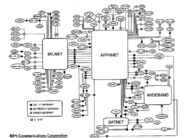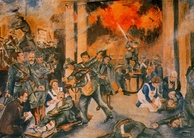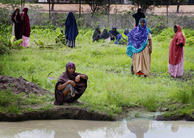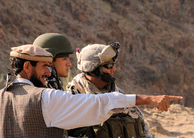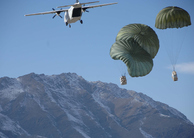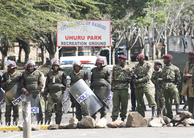|
Terrorism (tagged articles)
The keyword Terrorism is tagged in the following 39 articles.
2021, Vol. 13 No. 10
This paper assesses the political preferences and ideologies of the Trump administration and how they influenced framing issues in a way that has underestimated the threats of right-wing militia groups in the United States. President Trump and officials... Read Article »
2017, Vol. 10 No. 2
The global network of the Islamic State of Iraq and Syria (ISIS), also known as Daesh,2 is expanding rapidly. Southeast Asia is especially vulnerable because of its large Muslim population and its history of extremist groups. In fact, some experts... Read Article »
2017, Vol. 10 No. 2
For three decades prior to 9/11, West Germany fought its own war on terror. For 28 years, it faced off against the Red Army Faction (RAF), a small yet highly adaptable terrorist organization that constantly evolved to meet the countermeasures deployed... Read Article »
2017, Vol. 7 No. 2
Although Terrorism has been present in the world for centuries, it is only since the 1980s that suicide Terrorism has become an object of study for academics and an existing concern for government professionals. While discourses on suicide Terrorism... Read Article »
2016, Vol. 8 No. 12
In 1931, Kenneth Burke challenged the idea that literature and art were merely ornamental. “All of the verbal arts,” he explained, “including literature, drama, speech, pedagogy, and reportage, affect both social knowledge and... Read Article »
2016, Vol. 10 No. 1
In the past five years, millions of people have lost their homes, loved ones, and lives.2 The Syrian territory is now a battlefield, contested by multiple actors. The rise of the Islamic State underscores the hopeless nature of this bloody quagmire... Read Article »
2016, Vol. 8 No. 11
In the early 1990s, two terrorist organizations, Hamas and the Fatah-led Palestinian Liberation Organization (PLO), were using Terrorism to promote their political plight of Palestinian self-determination. Although both organizations vowed to use... Read Article »
2016, Vol. 8 No. 11
The Islamic State of Iraq and Syria (more commonly known as “ISIS,” but also referred to as the “Islamic State of Iraq and the Levant” or simply “the Islamic State”) has been on a reign of terror in the Middle... Read Article »
2016, Vol. 8 No. 10
This quote by the early 20th century Lebanese poet Kahlil Gibran captures both the core idea and some of the implicit issues posed by what was later to be called the “risk society thesis” and was to have a massive impact on contemporary... Read Article »
2016, Vol. 8 No. 10
In the aftermath of the attacks on September 11, 2001 fear and anger shaped American attitudes in response to Terrorism. Even so, this alone does not explain how Americans became open to the use of torture during the “Global War on Terror&... Read Article »
2016, Vol. 8 No. 09
Understanding the term 'terrorist' is a complex and controversial issue within both academic scholarship and mainstream literature. By adopting a post-structuralist approach to the study of ' Terrorism,' we are able to dissect the terms and understand... Read Article »
2016, Vol. 2015/2016 No. 3
In 1993, Israeli Prime Minister Yitzhak Rabin dismissed the possibility of negotiating with leaders of the Palestine Liberation Organization (PLO), claiming that there is no sense in talking to a terrorist organization. Meanwhile, as it later became... Read Article »
2016, Vol. 6 No. 2
Though somewhat counterintuitive given terrorist organizations' clandestine nature, such organizations do engage in strategic alliances and partnerships with one another. A handful of scholars have grappled with terrorist alliances, but a gap in... Read Article »
2016, Vol. 9 No. 2
Bataclan. San Bernadino. One need not read any further to understand how radicalization is crucial to counter Terrorism and national security. Some states have implemented counter-radicalization strategies to cull Terrorism at its root. These tactics... Read Article »
2016, Vol. 9 No. 1
From the Ku Klux Klan's lynchings to al Qaeda's World Trade Center attacks, terrorist organizations have historically exploited fear and destruction to achieve their end goals. Attacking both a nation's government and population, terrorist organizations... Read Article »
2015, Vol. 6 No. 1
Understanding social media, an integral part of 21st century American life, is more important than ever. On the one-year anniversary of the 2013 Boston Marathon bombings, it is clear that Twitter was a primary source of information for many Americans... Read Article »
2015, Vol. 7 No. 02
The Haqqani Network has proven itself to be one of the most deadly, daring and inventive terrorist organizations in modern times. Based in the Pakistani tribal lands of North Waziristan, the network has a deep relationship both with the Pakistani... Read Article »
2014, Vol. 6 No. 09
Since the attacks of September 11th, the Western world has labeled al-Qaeda and its leadership as suicidal and irrational terrorists hating the Western 'way of life'[2]. This justified the American "War on Terror" and led Margaret Thatcher to declare... Read Article »
2014, Vol. 6 No. 07
In March 2011 peaceful protests over the arrest and torture of young Syrians, themselves having drawn slogans refering to the revolutions in Egypt and Tunisia on walls in Syria’s Daraa, led to the killing of six civilians by Syrian police.... Read Article »
2014, Vol. 6 No. 04
After 35 years of war in Afghanistan[1], the year 2014 brings two milestones capable of major impact on the future – for better or worse. Firstly, the presidential elections that took place in early April, so far reported to be relatively... Read Article »
2014, Vol. 2013/2014 No. 1
IT is important to note th at the duty to cooperate, despite at times having been called a fundamental principle of international law2 has not been adequately defined.3 An expansive interpretation would be 'the duty to reach an agreement', which... Read Article »
2013, Vol. 4 No. 1
The rise of Islamist militant groups and their propensity towards violence has perplexed researchers and policy-makers and lead to debate about how to handle this evolving asymmetric threat. However the general focus of past research has been on... Read Article »
2013, Vol. 5 No. 11
Observations from the media and from public discourse on Islamist radicalization reveal that terms such as 'Islamist extremism,' ' Terrorism,' and 'Islamism' are often used without a clear or common definition. The same can be said for the use of... Read Article »
2013, Vol. 5 No. 09
Islam has been under siege since 2001 and in today's political environment, Muslims are too often associated with Terrorism. The heinous attacks of 9/11 were treated by the U.S. not as crimes – which would require criminal prosecution and... Read Article »
2013, Vol. 5 No. 08
After World War II, the United States military gradually came into a position of overwhelming dominance in the world. Military spending in the United States far outpaces that of other countries, with their world share of military expenditures at... Read Article »
2013, Vol. 5 No. 06
On Wednesday, April 19, 1995, Timothy McVeigh detonated a bomb at the base of the Alfred P. Murrah Federal Building. For the 168 individuals who lost their lives and the countless more injured and affected by the tragedy, otherwise going about their... Read Article »
2013, Vol. 6 No. 2
"If you wish to fault the administration, it's that we didn't have a clear picture, and we probably didn't do as clear a job explaining that we did not have a clear picture, until days later, creating what I think are legitimate questions." U.S.... Read Article »
2012, Vol. 4 No. 10
On October 26, 2001, President George W. Bush signed the USA PATRIOT Act in response to the September 11, 2001 terrorist attacks. The Act, by Congress just six weeks after the attacks with virtually no public debate, greatly-expanded the executive... Read Article »
2012, Vol. 4 No. 04
Today, we live in the aftermath of the Internet revolution. Humanity has never before been more interconnected or had as much access to the same tools and information. As a driving force behind globalization and modern progress, the Internet enables... Read Article »
2012, Vol. 4 No. 03
The Internet is the world’s great equalizer. As the driving force behind globalization and modern progress, the Internet has enabled us to communicate with others across the world almost instantly and provides a medium for cultural, informational... Read Article »
2011, Vol. 3 No. 12
"We must take the offensive! Action gives life, action gives health. At present the Irish cause is received with a hiss and a sneer. This is telling against us. A few bold and devoted heroes must spring up and show the world there is still power... Read Article »
2011, Vol. 3 No. 08
Somalia is home to roughly 9 million people, the overwhelming majority of whom are ethnic Somalis (UN Statistics Division 2010). The country has been plagued with conflict and disorder beginning just years after it attained independence. Following... Read Article »
2011, Vol. 4 No. 2
This paper traces and analyzes the organizational evolution of al-Qaeda from the late 1980s to the present day. It notes that al-Qaeda initially exhibited a hierarchical system and then adopted a hub network approach. Following 9/11 and the U... Read Article »
2010, Vol. 4 No. 1
Supporters of “green-badgers”—the nickname given to contractors working inside the American intelligence community—argue that after 9/11 the United States needed a more flexible labor pool of intelligence professionals to... Read Article »
2010, Vol. 2 No. 09
Postcolonial Kenya has seen a significant amount of development, both politically and economically, since its independence in 1963. Starting with the presidency of Jomo Kenyatta, the nation prospered -- experiencing economic growth of at least 5... Read Article »
2010, Vol. 2 No. 02
The Chechen people have endured a long history of aggression, culminating at the end of the twentieth century during which a separatist struggle against Russia began, triggering the First Chechen War in 1994. At the onset of the Second Chechen War... Read Article »
2009, Vol. 1 No. 12
A giant hole is ripped in the side of a skyscraper. Smoke and flames pour out and debris tumbles into the street. Clouds of smoke billow upwards and burning embers rain down. Plumes of dust and smoke blot out the sun, darkening the city skyline.... Read Article »
2009, Vol. 1 No. 11
As the sophistication of cyber criminals continues to increase, their methods and targets have also evolved. Instead of building the large Internet worms that have become so familiar, these criminals are now spending more time concentrating on wealth... Read Article »
1997, Vol. 1996/1997 No. 2
Threats to international security may assume many guises all of which deserve thorough analysis. Indeed, as we approach the new millennium, there are a multitude of ‘morbid symptoms’ which threaten to thwart any attempts at achieving... Read Article »
Expedited Article Review
Submit an article and get a decision fast.
If you need a fast decision, INQUIRIES Journal offers expedited processing of your submission for a small fee. Depending on the expedited review option you choose, you can receive a decision in as few as 5-days.
In addition to a shorter review period, the fee supports the journal's continued operation and open-access publishing model. Standard submissions are always free. Submit Now » - Submit an Article to Inquiries Journal -
|

